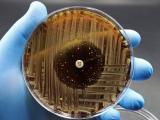A leading cause of hospital-associated infections is becoming increasingly resistant to alcohol-based disinfectants, a team of Australian researchers report today in Science Translational Medicine.
In an analysis of bacterial samples taken from two Australian hospitals over 19 years the researchers found that the more recent isolates of Enterococcus faecium were much more tolerant to alcohol exposure than older isolates. The older isolates were collected before and a few years after alcohol-based hand rubs were systematically introduced to Australian hospitals.
The findings suggest that E faecium could be adapting to alcohol-based hand rubs, which have become an integral part of standard infection control strategies in hospitals. That could make it harder for hospitals to contain the spread of E faecium infections, including those caused by vancomycin-resistant Enterococci (VRE), a hospital-associated superbug that's been on the rise in hospitals around the globe.
"Whatever the drivers, the development of alcohol-tolerant strains of E. faecium has the potential to undermine the effectiveness of alcohol-based disinfectant standard precautions and may, in part, explain the increase in VRE infection that is now widely reported in hospitals in Europe, Asia, the Americas, and Australia," the authors of the study write.
Ten-fold increase in alcohol tolerance
The researchers conducted the analysis of 139 E faecium isolates to get a better understanding of why hospital-acquired E faecium infections have been rising in Australia since alcohol-based hand rubs were introduced to Australian hospitals in 2002, while MRSA infections have been falling. They suspected it might have something to do with increasing tolerance to the hand rubs, which are now widely used in Australian hospitals to prevent the spread of infections. A 2015 Australian National Hand Hygiene Initiative report found that more than 80% of Australian healthcare facilities are compliant with the program.
To test their theory, they developed an assay to test the tolerance of the isolates, collected from 1997 through 2015, to a solution containing 23% isopropyl alcohol. The results showed that the isolates collected after 2009 were 10 times more tolerant to alcohol than those collected before 2004, and that the date of isolation was a much better predictor of survival than the genotype.
The researchers then used a mouse infection model to assess the clinical relevance of this increased alcohol tolerance, coating the floors of mice cages with the E faecium isolates and then wiping them down with a solution containing 70% isopropyl alcohol—the amount contained in alcohol-based hand rubs. That experiment showed that the alcohol-tolerant isolates were more able to withstand disinfection and colonize the guts of the mice.
Genomic analysis revealed that mutations in genes responsible for carbohydrate uptake and metabolism had accumulated in the alcohol-tolerant isolates and were associated with the increased resistance.
The authors worry that as alcohol tolerance continues to rise in E faecium, there will be skin and hospital surfaces that don't receive proper cleaning with alcohol-based disinfectants, either because an insufficient amount is being used, or because of inadequate exposure times. That could mean hospitals have to rely more on active surveillance and strict contact precautions to control the spread of VRE, an approach they say is cumbersome and expensive.
"In hospitals with endemic VRE, it would seem prudent to optimize adherence to alcohol-based disinfectant protocols to ensure adequate exposure times and use of sufficient volumes of product, particularly each time a health care worker cleans their hands," they write.
The authors say the next step will be to see whether alcohol tolerance is emerging in E faecium in hospitals in other parts of the world.
See also:
Aug 1 Sci Transl Med study
























